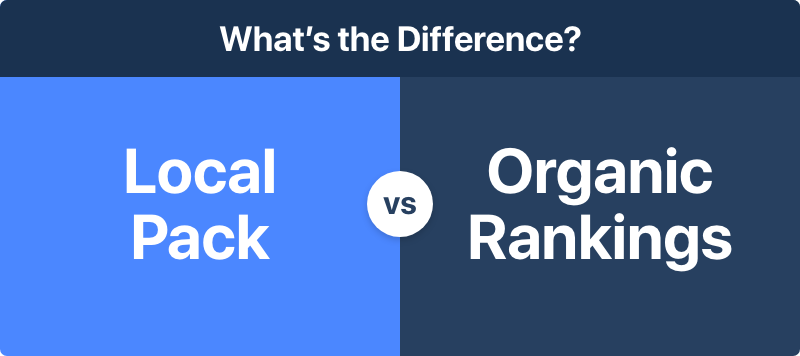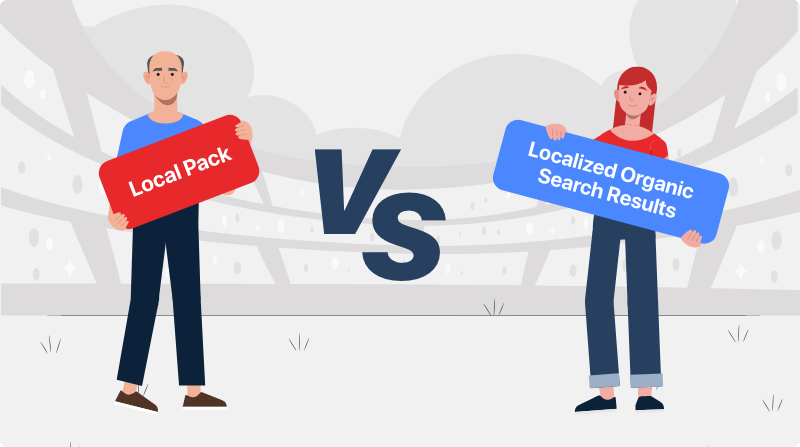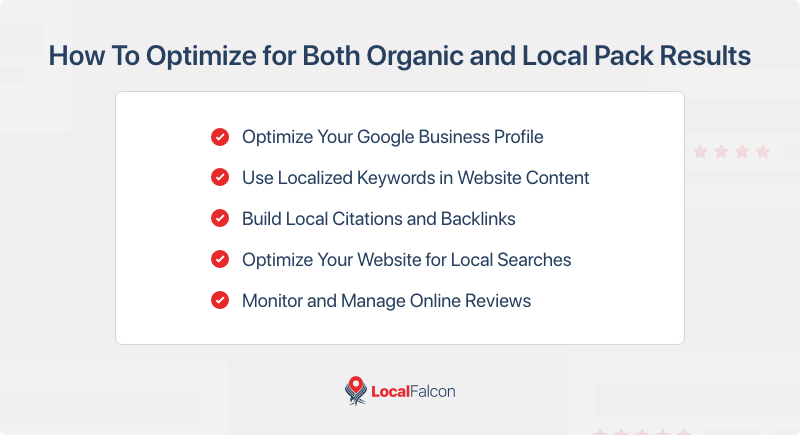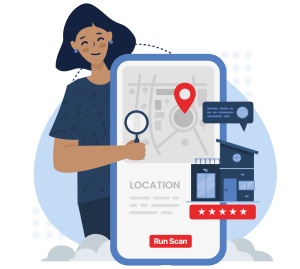If you're focused on local SEO, one of the most important decisions to make is whether your business should optimize for organic search rankings, the local pack, or both. The right choice depends on the type of business you run and how customers search for your products or services.
For most local businesses, ranking in the local pack is far more important than ranking in the standard organic search results. That being said, organic rankings still play an important role in local SEO.
Ideally, a well-rounded local SEO strategy should aim to get a business to appear in both places, but if resources are limited, prioritizing the local pack will yield better results for most types of local businesses.

Local Pack Versus Organic Rankings: What's the Difference?
Understanding the difference between the local pack and organic rankings is the key to knowing where to focus your SEO efforts.
What Is the Local Pack?
The local pack, also called the map pack or the Google 3-pack, is the set of three business listings that appears at the top of Google's search results for local queries. It's highly visible, mobile-friendly, and directly connected to Google Maps, making it a prime source of leads for businesses that serve customers in specific geographic areas.
Local pack results appear at the top of Google whenever a user searches for goods or services with local intent. This means they're performing queries like "plumber near me" or "best coffee shop in Chicago."
Google's local pack listings are displayed alongside a map, and they include key business details like name, address, phone number, hours of operation, star ratings, and a link to Google Business Profile (GBP).
The local pack is powered by Google's local search algorithm, which considers ranking factors like relevance, proximity, and prominence.
Unlike organic results, which depend on traditional website SEO, a business's appearance in the local pack is heavily influenced by its Google Business Profile optimization and customer reviews.
What Are Organic Rankings?
Organic search rankings refer to the traditional blue-link search results that appear beneath the local pack. These rankings are determined by Google's broader search algorithms, which assess factors like a website's user experience, content quality, backlinks, domain authority, and keyword relevance.
Depending on the search query, organic results can include local businesses, national and international websites, or a mix of both.
For example, if you search for "fix a leaky faucet in Seattle," the top results will likely be links to the business sites for various local plumbers. However, if you just search for "how to fix a leaky faucet," you'll probably see a mix of links to articles on more general home improvement blogs as well as on plumbers' sites.

Local Pack vs. Localized Organic Search Results: Which Is More Important for Local SEO?
For the vast majority of local businesses, ranking in the local pack is far more valuable than ranking in organic results. Here are the top reasons why:
The Local Pack Dominates Search Results
Google gives prime real estate to the local pack, especially on mobile devices where it often takes up the whole screen.
When users perform local searches, the 3-pack is often the first thing they see, pushing organic results further down the page.
Local Pack Listings Drive High-Intent Traffic
People who search for local services are typically ready to take action, whether that's calling a business, visiting a store, or booking an appointment. The local pack makes it easy for users to engage with businesses instantly.
The Local Pack Is Tied to Google Maps
Since the local pack results sync directly with Google Maps, businesses that rank here benefit from increased visibility for users searching in the Maps app or using Google's navigation features.
Google Business Profile Optimization Is More Accessible
Unlike organic rankings, which rely on complex website SEO factors, local pack rankings are mainly influenced by GBP optimization, making it a more accessible and controllable ranking opportunity for businesses of all sizes.
Despite all of these reasons why ranking in the local pack is more important for most local businesses, organic rankings shouldn't be ignored entirely. If a business can rank in both the local pack and organic results for the same search query, it doubles its chances of attracting clicks.
Additionally, industries that often rely on informational content to attract new clients, such as law firms, healthcare providers, and different types of consultants, can benefit more from strong organic rankings.
Service-area businesses can also greatly improve their visibility by getting localized service pages to rank in organic results, since they can't have a different GBP listing for every area they serve if they don't have different physical locations as well.

How To Optimize for Both Organic and Local Pack Results
While results for organic and local pack listings rely on different ranking factors, there is some overlap in the strategies that can improve both. Here's how businesses can optimize for maximum visibility in both search areas:
1. Optimize Your Google Business Profile
Since GBP is the foundation of local pack rankings, it's crucial to fully optimize your profile. Make sure to fill out all the fields that impact rankings and take advantage of additional features that provide users with a better experience and help convert leads into new customers.
- Ensure your business name, address, and phone number (NAP) are accurate and match the info on your website and other platforms.
- Choose the most relevant business category and add secondary categories if applicable.
- Write a detailed business description.
- Upload high-quality photos showcasing your business, products, and services.
- Regularly post updates, offers, and events to keep your profile active.
- Encourage customers to leave reviews and respond to them promptly.
2. Use Localized Keywords in Website Content
To rank well in both the local pack and organic results, your website content should target location-specific keywords.
- Include city or neighborhood names in your page titles, meta descriptions, and headers.
- Create hyperlocal service pages to target different locations if you serve multiple areas.
- Write locally relevant blog content about local events, industry trends, or community involvement.
3. Build Local Citations and Backlinks
Google evaluates a business's prominence based on how often it's mentioned online. Building local citations and earning backlinks can help improve both local and organic rankings.
- List your business in high-quality directories such as Yelp, Tripadvisor, Facebook, and industry-specific sites.
- Get featured in local news outlets, blogs, or community websites.
- Partner with other local businesses for cross-promotional content.
4. Optimize Your Website for Local Searches
A well-optimized, technically-sound website supports both local pack and organic rankings.
- Mobile-friendly design: Since most local searches happen on mobile devices, your site must be responsive and easy to navigate.
- Fast loading speed: Google prioritizes fast-loading sites in search rankings. Use tools like Google PageSpeed Insights to identify speed improvements.
- Schema markup: Adding local business schema helps Google understand your business information and improves search visibility.
- Click-to-call and contact buttons: Make it easy for visitors to take action by including clickable phone numbers and contact forms.
5. Monitor and Manage Online Reviews
Customer reviews play a huge role in local pack rankings, and they also influence consumer trust.
- Ask satisfied customers to leave reviews on Google and other platforms.
- Respond to all reviews, both positive and negative, to show engagement.
- Address negative feedback professionally and work to resolve customer issues.
- Conduct review analysis to identify trends and improve future reviews.
Conclusion
While organic search rankings have value for local SEO, most local businesses should prioritize ranking in the local pack to drive more leads, calls, and foot traffic.
The local pack is highly visible, action-oriented, and directly linked to Google Maps, making it the most effective way for businesses to connect with potential customers in their area.
However, businesses that invest in both local pack and organic optimization can achieve even greater visibility.
By focusing on key strategies like Google Business Profile optimization, local keyword targeting, citation and backlink building, and technical website SEO, businesses can improve their chances of appearing in both search areas, ultimately leading to more traffic, higher conversions, and greater long-term success!


